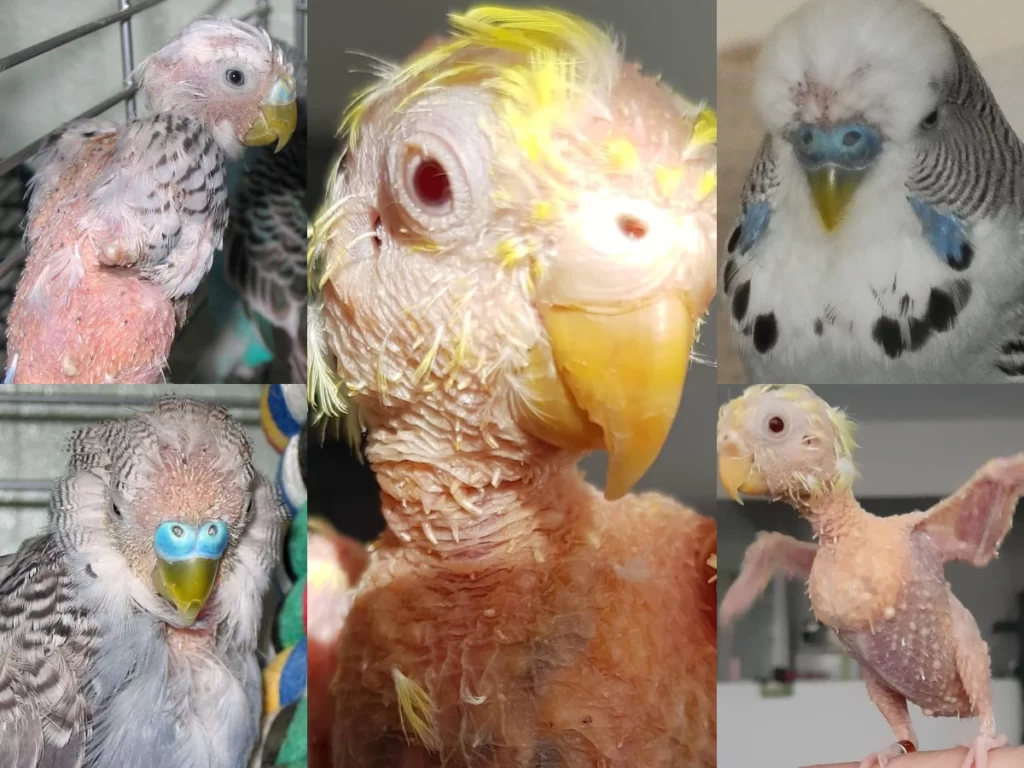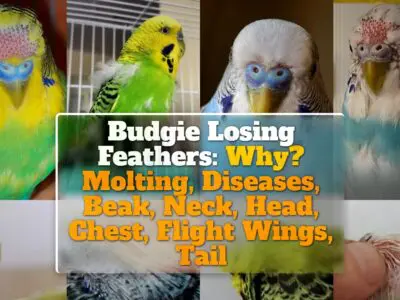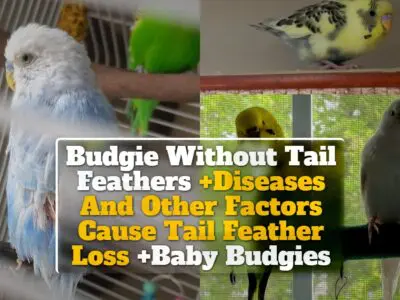When a feathered friend like a budgie starts to lose its feathers, it’s a sign for the owner to perk up and pay attention.
We’re going to look at the different reasons why your budgie might be losing feathers, from their head to their tail, including the natural shedding process, environmental triggers, and medical issues.
Budgies without feathers can result from a variety of reasons, including molting, poor diet, stress, or disease.
Flight, wing, and tail feathers may fall out due to molting or trauma, while head feathers loss might indicate overgrooming or parasitic infections.
Baby budgies initially lack feathers but start to develop them after a few weeks.

Is It Normal For Budgies With No Feathers?
This might come as a surprise for a novice budgie owner, but yes, it can be normal for budgies to have no feathers under certain conditions.
Budgies, just like other birds, experience cycles of feather growth, shedding, and replacement.
During these cycles, there might be periods when a budgie appears to be featherless, especially during the molting process.
This feather loss can be quite extensive, leading to the misconception of the bird being ‘featherless.’ However, the lack of feathers, if prolonged or accompanied by other signs of distress, could indicate underlying health problems.
When Is It Normal For Budgies To Be Featherless?
The answer lies within the budgie’s life cycle and its molting process.
Molting is a natural process through which budgies shed their old feathers to make room for new ones.
The timing and duration of this process can vary, but it typically occurs once or twice a year, and can last a few weeks to a couple of months.
During this period, budgies can appear somewhat featherless or scruffy-looking.
However, this should be a temporary situation, and soon enough, your budgie should be covered in a fresh set of feathers.
Is It Normal For Budgies To Lose Feathers?
Absolutely! Feather loss is a normal part of a budgie’s life.
Budgies shed their feathers periodically in a process called molting, making room for new feather growth.
It’s similar to how humans shed hair.
Therefore, finding a few loose feathers around your budgie’s cage isn’t usually a cause for concern.
However, the extent and pattern of feather loss can sometimes indicate health problems.
Feather loss that leaves a budgie with large bald patches or happens outside of the typical molting period may be a sign of stress or disease.
When Is It Normal For Budgies To Lose Feathers?
Molting season is the most common time for budgies to lose feathers.
This usually occurs once or twice a year and can last from a few weeks to a few months.
It’s during these periods that you’ll find the most feathers scattered around the cage.
Also, a budgie might lose a feather or two if it’s frightened or stressed, which is an automatic response designed to help the bird escape from predators in the wild.
What Causes Budgies To Lose Their Feathers?
A multitude of factors can cause budgies to lose feathers, ranging from the natural and benign to serious health conditions.
Molting, stress, parasites, malnutrition, and illness can all contribute to feather loss.
Understanding these different factors is crucial to ensuring your budgie’s health and wellness.
Body Feathers: Why Do Budgies Lose Their Body Feathers?
Budgies can lose body feathers for several reasons, many of which are perfectly normal.
Molting is the most common reason, and it is a natural process that budgies go through periodically.
However, there are also other possible reasons for budgies losing body feathers, such as parasites, allergies, infections or skin conditions, and feather picking or barbering.
Molting
Molting is a natural part of a budgie’s life cycle.
During this process, the budgie sheds its old feathers and grows new ones.
This typically occurs once or twice a year and can result in a significant loss of body feathers.
It’s an essential process, however, as it allows the budgie to maintain healthy feathers, which are vital for flying, regulating temperature, and attracting mates.
Parasites
Parasites such as mites or lice can infest a budgie’s feathers, causing them to fall out.
These tiny pests can cause intense itching and discomfort, leading the budgie to preen excessively and pull out its own feathers.
If your budgie is losing feathers and also scratching or preening more than usual, parasites could be to blame.
Allergies
Budgies, like humans, can develop allergies.
These can be to certain foods, materials in their environment, or even to certain types of dust or mold.
Allergies can lead to skin inflammation and irritation, causing the budgie to scratch and pull out its own feathers.
Infections Or Skin Conditions
Infections or skin conditions, such as fungal or bacterial infections, can cause a budgie to lose its feathers.
These conditions can cause inflammation, discomfort, and damage to the skin, leading to feather loss.
Feather Picking Or Barbering
Feather picking or barbering is a behavior where budgies pull out their own feathers.
This is often a response to stress, boredom, or anxiety.
It can also be a learned behavior that is passed down from parents to offspring.
Head Feathers: Why Do Budgies Lose Their Head Feathers?
The loss of head feathers in budgies can be attributed to a variety of factors, including excessive preening, rubbing against solid objects, barbering by other budgies, viral infections, mites, and parasites.
Understanding these factors can help you provide the appropriate care for your feathered friend.
Excessive Preening
Budgies preen their feathers to clean them and keep them in top condition.
However, excessive preening can lead to the loss of head feathers.
This behavior is often triggered by itching or irritation, possibly due to skin conditions, allergies, or parasites.
Rubbing Against Solid Objects
If your budgie frequently rubs its head against solid objects, this could lead to feather loss.
The bird might be doing this to scratch an itch, alleviate discomfort, or even just because it enjoys the sensation.
Barbering, Overgrooming By Other Budgies:
Overgrooming, or ‘barbering,’ occurs when one budgie excessively preens another, leading to feather loss.
This behavior can stem from dominance issues, stress, or boredom.
Viral Infections
Certain viral infections can cause budgies to lose their head feathers.
For example, Psittacine Beak and Feather Disease (PBFD) can result in feather loss and abnormalities.
Mites
Mites, tiny parasitic insects, can cause irritation and inflammation, leading to feather loss.
The head and face are common areas where mites tend to congregate.
Parasites
Apart from mites, budgies can also be infested by other parasites like lice.
These parasites can cause significant discomfort, leading to scratching, preening, and consequent feather loss.
Wings And Flight Feathers: Why Do Budgies Lose Their Wings Feathers?
Wing feather loss in budgies can be due to several reasons, including molting, trauma or injury, wing clipping, and nutrient deficiency.
Understanding these reasons can help budgie owners to better care for their pets.
Molting
Molting, as mentioned earlier, is a natural process where budgies shed old feathers and grow new ones.
This includes the feathers on the wings, which are essential for flight.
Trauma Or Injury
Physical trauma or injury can result in budgies losing their wing feathers.
This can be due to accidents like collisions or attacks by other animals.
Wing Clipping
Wing clipping is a common practice for bird owners who wish to limit their budgie’s flight capacity for safety or training reasons.
However, if performed incorrectly, it can lead to problems.
Clipping too close to the feather shaft can indeed result in feather loss in budgies.
This occurs because the clip may inadvertently cut into the feather follicle, leading to damage and thus causing the feather to fall out.
Moreover, an improperly clipped wing can lead to discomfort and stress for the budgie, which might provoke it to engage in feather-plucking behaviors, leading to further feather loss.
It’s crucial to have a trained professional or a veterinarian perform wing clipping to avoid any potential harm.
Budgies have blood feathers – growing feathers with a supply of blood – and if these feathers are accidentally clipped, it could lead to significant bleeding.
Therefore, always ensure that your budgie’s wing clipping is done appropriately to maintain their feather health and overall well-being.”
Nutrient Deficiency
A deficiency in key nutrients like protein, vitamins, and minerals can result in poor feather health and consequently, feather loss.
This can impact all feathers, including those on the wings.
Tail Feathers: Why Do Budgies Lose Their Tail Feathers?
Budgies might lose their tail feathers due to molting, trauma or injury, rough handling, tail feather chewing or picking, inadequate perching or cage setup, or plucking by other cage mates.
Molting
As stated previously, molting is a normal process where budgies shed their old feathers, including the tail feathers, to make room for new growth.
Trauma Or Injury
Physical trauma or injury, such as accidents or fights with other birds, can result in loss of tail feathers.
These feathers can grow back over time, but the bird may need to be separated from others to prevent further harm.
Rough Handling
Rough handling can result in injury and stress to the bird, leading to feather loss.
When held too tightly or handled aggressively, budgies might lose feathers, particularly from the tail and wings, due to physical damage or stress-induced plucking.
Therefore, it’s crucial to handle your budgie gently, with care, and patience.
Additionally, educating all members of the household about appropriate bird handling can help prevent accidental feather loss due to rough handling.
Tail Feather Chewing Or Picking
Budgies may chew or pick at their own tail feathers due to stress, boredom, or underlying health conditions.
If you notice this behavior, it’s crucial to identify the cause and take action to address it.
Inadequate Perching Or Cage Setup
An inadequate or improperly set up cage could lead to tail feather loss.
For example, if the perches are too close to the cage walls, the budgie’s tail feathers may constantly rub against the cage, leading to feather loss.
Plucking By Other Cage Mates
Just like with head feathers, tail feathers can also be plucked by other birds in the cage.
This is usually a sign of stress, overcrowding, or social issues among the birds.
Feathers Around Eyes: Why Do Budgies Lose Their Feathers Around Eyes?
Feather loss around the eyes in budgies can be due to rubbing the face during molt, Parrot Fever (Psittacosis), or irritated eyes.
Rubbing The Face During Molt
During the molting process, new feathers (pin feathers) can cause discomfort as they push through the skin, leading budgies to rub their faces and possibly cause feather loss around the eyes.
Parrot Fever
Parrot Fever, also known as Psittacosis, is a bacterial infection that can cause inflammation and irritation around the eyes, leading to feather loss.
Irritated Eyes
Irritation due to dust, allergens, or infections can cause a budgie to scratch or rub its eyes, resulting in feather loss.
Why Don’t Baby Budgies Have Feathers?
When baby budgies, also known as chicks, are born, they do not have feathers.
Instead, they are covered in a thin layer of downy fluff which is not as visible or distinct as feathers in adult birds.
As the baby budgie grows and develops, this fluff will be replaced by proper feathers through a process called fledging.
The lack of feathers at birth is a normal part of the bird’s life cycle, just like with many other bird species.
Why Has My Baby Budgie Started Shedding?
A baby budgie will start shedding, or molting, as part of its growth and development process.
The first molt usually happens when the budgie is around 12 weeks old.
During this time, they will begin to lose their baby feathers, which will be replaced by adult feathers.
This process can result in a lot of feathers appearing in the cage, which can sometimes alarm new bird owners.
However, this is a normal and healthy part of a budgie’s life cycle.
Faqs
Why Do Budgies Lose Their Feathers Naturally?
Budgies naturally lose their feathers during a process called molting.
This is a normal part of a budgie’s life cycle and happens to allow for new feather growth.
Molting can occur due to changes in season, temperature, and daylight hours.
When And How Often Do Budgies Molt, Lose Their Feathers Naturally?
Budgies typically have their first molt around 12 weeks of age, and after that, they generally molt every 6 to 12 months.
The frequency and duration of molting can vary depending on factors such as age, diet, general health, and environmental conditions.
How Can I Differentiate Between Molting And Feather Plucking In My Budgie?
During molting, a budgie will lose and regrow its feathers evenly and symmetrically.
You may notice a lot of feathers in the cage, but the bird should still look relatively full-feathered.
In contrast, feather plucking often results in bald patches or uneven feather loss.
You might also notice the bird repeatedly pulling at its feathers.
Do Budgies Experience Discomfort When Their Feathers Are Pulled Out?
Yes, budgies can experience discomfort or even pain when their feathers are pulled out.
Feathers are attached to the skin, and forcible removal can cause a similar sensation to a human having their hair pulled out.
It’s essential to never attempt to pull out a budgie’s feather unless you are a trained professional dealing with a broken or blood feather.
What Spray Can I Use On My Budgie To Prevent Feather Plucking?
There are various sprays available in the market that can help prevent feather plucking in budgies.
However, it’s important to know that these sprays are not a cure-all solution.
They should be used in conjunction with addressing the root cause of feather plucking, which could be due to stress, poor diet, illness, or boredom.
Ailment-specific sprays, such as anti-parasitic sprays, can be used if the feather plucking is due to parasites.
Always consult with a vet before using any product on your budgie to ensure it’s safe and suitable for your bird.
Why Is My Budgie Not Regrowing Its Lost Feathers?
The rate at which a budgie regrows its feathers can depend on many factors including its diet, age, health status, and the type of feathers that were lost.
If your budgie is not regrowing feathers, it might be due to a nutritional deficiency, disease, or stress.
Providing a balanced diet rich in essential nutrients and reducing stressors can help.
However, if the problem persists, it’s best to consult a vet.
Can My Budgie Fly Without Its Flight Feathers?
Without flight feathers, your budgie will struggle to fly properly.
These feathers are critical for flight as they help with lift and direction.
A budgie may still be able to flutter or hop around without these feathers, but their ability to fly long distances or with agility will be impaired.
What Should I Do If My Budgie’s Tail Feathers Won’t Grow Back?
If your budgie’s tail feathers are not growing back, it may indicate a health problem such as mites or a nutritional deficiency.
Try improving the bird’s diet with high-quality feed and fresh fruits and vegetables.
If this doesn’t help, consult a vet for further diagnosis and treatment.
My Baby Budgie Is Not Growing Feathers, Is This Normal?
Baby budgies are born without feathers and start developing them within a few weeks.
If your baby budgie has not started growing feathers after a month, it could be a sign of a health issue or nutritional deficiency.
Consult a vet for further guidance.
How Can I Help My Budgie Cope With Molting?
During molting, ensure your budgie has a balanced diet rich in proteins and vitamins, as feather growth requires these nutrients.
Regular baths or misting can also help keep your budgie comfortable by keeping their new growing feathers clean and helping to remove old feathers.
How Can I Prevent My Budgie From Losing Feathers?
Providing a balanced diet, maintaining a stress-free environment, regular grooming, and timely veterinary care are all essential in preventing unnecessary feather loss in budgies.
While you can’t prevent natural molting, these measures can prevent other causes of feather loss.
Sources:


